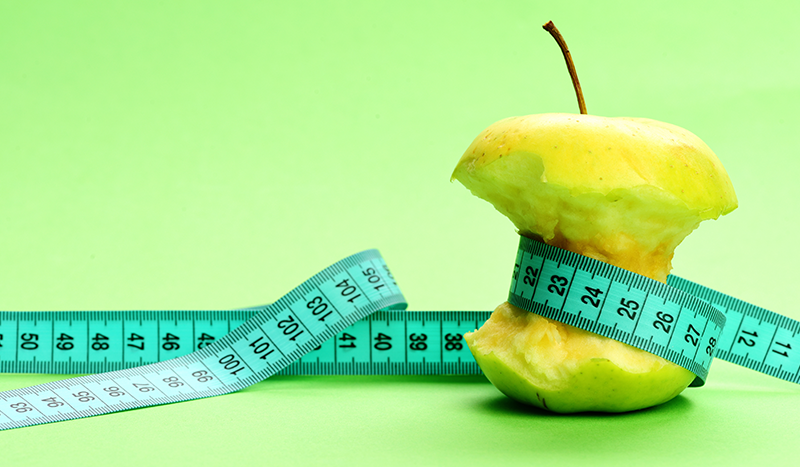Weight management for healthy joints
Your hips, ankles and knees are load-bearing joints, supporting your body and carrying all the weight. The heavier you are, the more pressure is on your joints and the faster they will wear out.
When you walk up or down a flight of stairs, the load on your knees is roughly seven times your body weight. If you’re overweight, that adds up very quickly. Losing just one stone will take around seven stone off your knee joint with every step, which is a good reason to start managing your weight.
Everyone knows losing weight can be difficult, particularly when you're struggling with joint pain, so discover the lifestyle changes you can make to keep your weight down and your motivation up:
Start moving your body

If joint pain is bad, it can be tempting to put your feet up and avoid exercise, but exercise can actually improve pain, as well as helping to keep your weight low.
Someone weighing 60lbs could introduce an extra 20-minute walk to their day before or after dinner and burn off up to 100 calories, which adds up to an extra 2 hours exercise (and an extra 700 calories burned) a week. Over a year, this short daily walk can make a huge impact on your weight.
Try introducing low impact exercises to your day, such as power walking, swimming, yoga and cycling. If you want to try something new, Barre is a class which combines ballet, yoga and Pilates with traditional ballet exercises, strengthening muscles to support joints and burning calories.
Whatever you choose, it’s important you find exercises you enjoy to keep your motivation levels up and prevent last minute cancellations.
Discover exercises you can do at home that are good for your joints
Give yourself time to adapt
One of the ways we set ourselves up to fail is by making too many changes too quickly and tiring ourselves out. Give your body a chance to adapt to your new lifestyle and introduce exercise slowly. If you’re used to a sedentary lifestyle, start making small changes like taking the stairs, standing up for your phone calls and walking to the shop rather than driving.
Make sure to warm up and stretch your body before and after exercising to avoid pain and injury.
A personal trainer can help you figure out a good routine that suits you and help you introduce exercise without burning yourself out.
Watch what you’re eating

Some foods we should be avoiding are obvious; high fat, high sugar and processed foods such as takeaways, ready meals and sugary snacks. But it’s worth checking labels even on foods that look healthier. Packaging can be deceptive, so check the sugar and fat content and where possible, cook from fresh so you know what you’re eating. Cook with fresh ingredients where possible so you know what you're putting in your body.
Keep an eye on your portion size. Many of us are eating the right foods, but we’re just eating too much of them. Reduce the number of calories you’re consuming every day by measuring out the recommended daily allowances.
You can also keep track of your calorie intake with apps and calculators that can measure what you’re eating for you. Remember, it takes 20 minutes for your brain to register that you’re full, so eating slowly and consciously, by sitting at the table and turning off the TV can help you eat less.
Not sure what a good portion size is? Discover our visual guide
Get organised
A meal plan can help you take charge of your eating behaviour, allowing you to plan and cook food in advance. If you don’t enjoy cooking, doing it all in one go means you don’t have to spend every night at the stove and can just reheat healthy meals from the freezer.
Do your food shopping online to avoid adding extra items and make sure you include a healthy snack you enjoy, so you’re not tempted to pop out for a sugary quick fix later on.
If you’re partial to a 3pm chocolate break, make sure you pack yourself healthy snacks and drink plenty of water to avoid binging throughout the day.
Motivation is key
If you find yourself undoing all of your hard work, ask yourself why. The chances are that you’re not enjoying your lifestyle changes, so find some things you do enjoy.

If you’re bored of the gym or can’t find the motivation to go swimming, why not try a new exercise class? If your gym routine isn’t giving you the changes you want, speak to a personal trainer about coming up with a new one. If you’re not enjoying the salads you’ve been preparing, get yourself a new cookbook and try some new recipes.
Make sure to reward yourself by setting small goals and treating yourself to a day out, a new pair of shoes or something that you enjoy.
If you feel you need some support, ask a friend to join you, join a weight support group or speak to your doctor about seeing a nutritional therapist who can help you plan your meals.
Related Video: Meet Our Experts–Goal Setting
This video is part of our on-demand 24/7 content. To view more videos and subscribe to our 24/7 virtual gym click here.
Last updated Tuesday 22 August 2023
First published on Tuesday 2 October 2018
